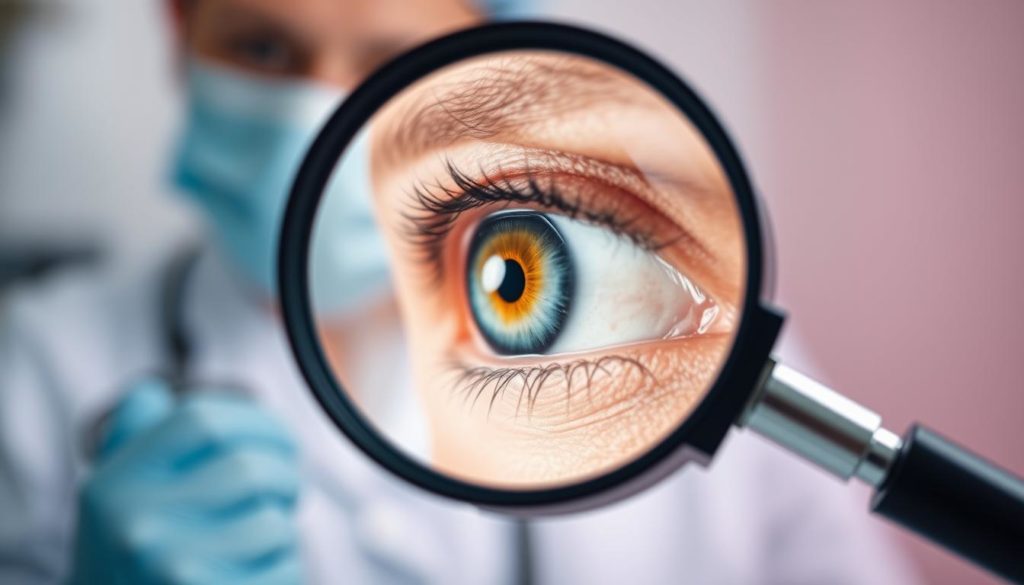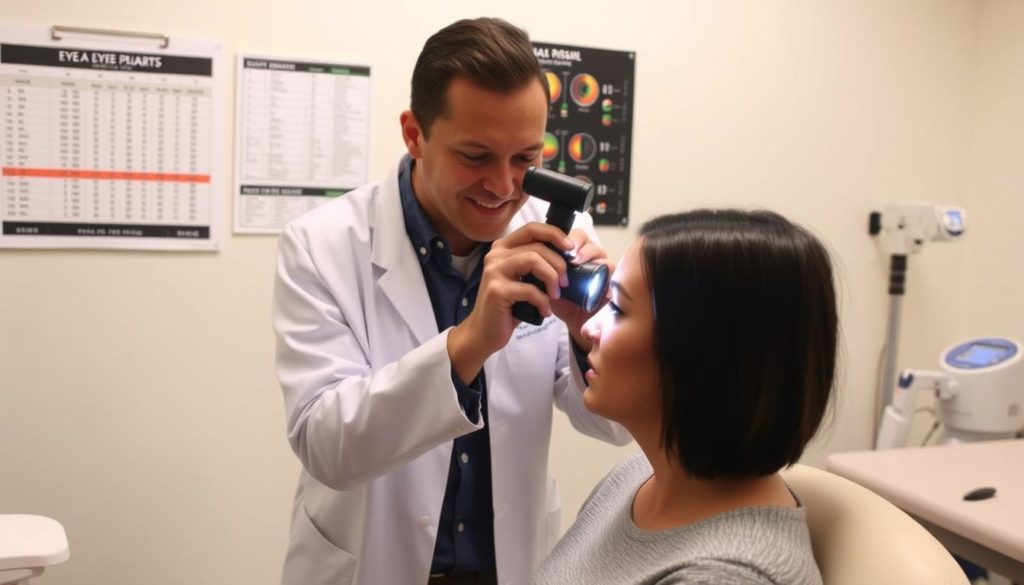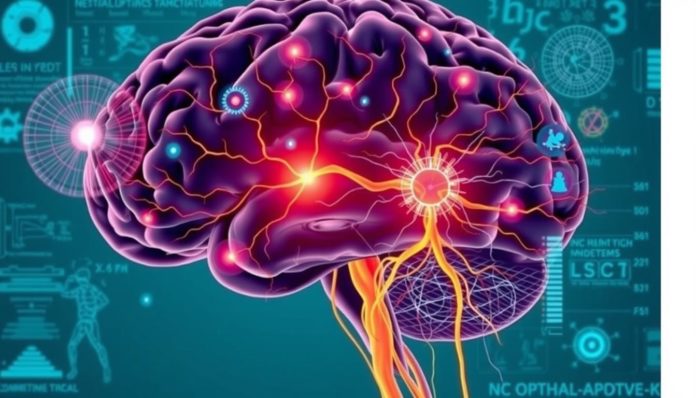Did you know that about 70% of the brain helps us see? This shows how important a neuro-ophthalmologist is in fixing vision issues. UCLA Health’s neuro-ophthalmology program is a top spot for treating eye problems linked to brain diseases.
At UCLA, neuro-ophthalmologists work with patients in and out of the hospital. They team up with other departments for a full approach to eye care. Their focus on research and advanced tests means they offer the latest treatments for eye health.
What is a Neuro-Ophthalmologist?
A neuro-ophthalmologist is a specialist who deals with vision problems caused by the nervous system. They combine knowledge from neurology and ophthalmology. This helps them treat complex vision issues that affect the optic nerves and other neural pathways.
These experts provide care that regular eye doctors can’t offer. They use their deep understanding of both fields to help patients.

Definition and Scope
According to the North American Neuro-Ophthalmology Society, neuro-ophthalmologists focus on vision problems linked to neurological issues. They handle conditions related to the optic nerves and complex vision disorders. Regular eye doctors can’t manage these issues.
Almost half of the brain is used for vision. This shows how vital this specialized field is.
Training and Certification
To become a neuro-ophthalmologist, one needs a lot of training and certification. They complete at least five years of clinical training after medical school. Most are double-board certified in Neurology and Ophthalmology.
This gives them a strong base to diagnose and treat various vision and neurological conditions. Their knowledge lets them solve complex vision problems from different medical angles.
The Role of a Neuro-Ophthalmologist in Eye Care
Neuro-ophthalmologists connect neurology and ophthalmology to give full eye care. They use a detailed approach to handle complex issues linked to the optic nerve and brain.

Diagnosing Vision Disorders
They are key in diagnosing vision disorders with a neurological cause. They use detailed checks and advanced tools to find hidden problems. These steps help figure out if eye issues are part of a bigger health problem, guiding treatment.
Multidisciplinary Approach
Neuro-ophthalmologists work with neurologists, neuroradiologists, and neurosurgeons in a multidisciplinary approach. This team ensures patients get a full check-up and care plans made just for them. This teamwork is crucial for complex cases where brain and vision issues meet.
Common Conditions Treated by Neuro-Ophthalmologists
Neuro-ophthalmologists are experts in handling complex eye issues linked to the nervous system. They provide full care for those with vision problems due to neurological disorders.
Optic Neuritis
Optic neuritis is an inflammatory issue that affects the optic nerve. It causes sudden vision loss and trouble seeing colors. Neuro-ophthalmologists use high-tech imaging to spot and treat it. They may prescribe medications like corticosteroids to lessen inflammation and save vision.
Myasthenia Gravis
Myasthenia gravis is an autoimmune disorder that messes with nerve and muscle communication. It leads to muscle weakness, especially in the eyelids and eye muscles. This can make eyelid control and double vision issues. Neuro-ophthalmologists are key in spotting this condition with special tests. They manage it with treatments like anticholinesterase drugs and immunosuppressants.
Strabismus
Strabismus, or crossed eyes, means the eyes don’t line up right. It can cause double vision and mess with depth perception. Neuro-ophthalmologists use eye muscle exercises, corrective lenses, and sometimes surgery to fix strabismus. This helps align the eyes and improve vision.
How Neuro-Ophthalmologists Diagnose Eye Problems
Neuro-ophthalmologists use advanced diagnostic tools and detailed exams to find and check eye issues. They know how to make a correct diagnosis. This helps them create treatment plans that meet each patient’s needs.
Diagnostic Tools
They use top-notch diagnostic tools to look at eye conditions closely. Optical Coherence Tomography (OCT) is a key tool, giving clear images of the retina’s layers. This helps spot problems early.
Other tools include visual field tests and fluorescein angiography. These map blood flow in the retina. Together, these tools give a full picture of the patient’s eye health. They help fix visual problems well.
Comprehensive Examinations
It’s not just about the tools; neuro-ophthalmologists do comprehensive eye examinations too. These check visual acuity, eye pressure, and color vision. They also check how well the nerves work, which is key for eye problems linked to the brain.
This complete check-up helps understand the patient’s full condition. It leads to better treatment plans. By using these methods, neuro-ophthalmologists aim to improve patients’ lives and outcomes.
Treatments Offered by Neuro-Ophthalmologists
Neuro-ophthalmologists offer treatments to improve vision and eye health. They work closely with each patient to create personalized plans. This ensures the best care for each person’s needs.
Medications
Medicines are key in treating many eye conditions. Doctors often prescribe corticosteroids to lessen swelling and treatments for autoimmune disorders. They also use antiviral drugs for infections that can harm the optic nerve.
Surgical Procedures
Surgery is needed for some conditions that don’t get better with medicine. Eye muscle surgery can fix eye misalignment. Other surgeries remove tumors that affect the optic nerve. The goal of these surgeries is to boost vision and eye health.
| Treatment Type | Description | Purpose |
|---|---|---|
| Medications | Corticosteroids, antivirals, immune system modulators | Reduce inflammation, fight infections, manage autoimmune disorders |
| Surgical Procedures | Eye muscle surgery, tumor removal | Correct visual misalignments, remove growths affecting vision |
The Importance of Research in Neuro-Ophthalmology
Research is key in neuro-ophthalmology, helping us understand and treat complex eye conditions. Studies lead to better patient care and new solutions. By focusing on research, experts can give patients the best, evidence-based treatments.
Participation in Clinical Trials
Clinical trials are vital for moving the field forward. Places like UCLA Health take part in these trials to find new treatments and check if they work. These trials let patients try new treatments early, sometimes even before they’re widely used. They’re crucial for making sure new treatments are safe and work well for more people.
Advancement of Treatment Options
Research leads to new and better treatments in neuro-ophthalmology. By looking at data from trials and studies, researchers can make treatments that fit each patient’s needs. These new treatments not only help patients more but also grow our knowledge in the field.
| Key Aspect | Impact of Research |
|---|---|
| New Therapy Discovery | Clinical trials test and prove new therapies, offering groundbreaking options for patients. |
| Treatment Personalization | Advanced treatments mean care can be tailored to each patient, leading to better results. |
| Broader Knowledge | Research data improve our understanding of eye conditions, leading to better care overall. |
Clinical trials and new treatments show how vital research is in neuro-ophthalmology. By focusing on these areas, the field can keep growing. This means patients get the most effective and latest care possible.
When to See a Neuro-Ophthalmologist
Knowing when to see a neuro-ophthalmologist is key for your eye health. If you notice your vision getting worse or having trouble with eye movements, it’s time to visit one. These specialists are experts in handling complex eye problems related to the nervous system.
If you suddenly see double or think a pituitary tumor might be affecting your optic nerves, see a neuro-ophthalmologist. They can spot and treat nervous system issues that affect your vision.
- Changes in visual acuity
- Difficulty with eye movements
- Sudden onset of double vision
- Unexplained visual disturbances
Getting treatment right away can stop things from getting worse and help keep your vision good. Neuro-ophthalmologists use advanced techniques and work with other experts. They use MRI and CT scans for accurate diagnoses.
Don’t wait to get help if you see your vision changing or have trouble moving your eyes. A visit to a neuro-ophthalmologist can check for nervous system problems and start the right treatment. This helps protect your vision and overall health.
Visual Disturbances and Their Relation to Neurology
Visual disturbances can come from many neurological conditions. These can be caused by trauma, stroke, infections, or brain issues. Knowing the causes and spotting symptoms early helps in managing and treating them.
Causes and Symptoms
Visual issues often show up as blurry vision, seeing double, or losing sight temporarily. These signs can be due to brain, optic nerve, or eye-brain pathway problems. Migraines, multiple sclerosis, and brain tumors can cause these problems. Spotting these signs early is key for quick help from a specialist like a neuro-ophthalmologist.
Impact on Daily Life
Visual disturbances can really change someone’s daily life. They can make everyday tasks hard, affect coordination and balance, and increase the risk of falls. Simple things like driving, reading, and walking can become tough, taking away independence. Getting the right help from a neuro-ophthalmologist is crucial to lessen these effects on daily life.
FAQ
What is a Neuro-Ophthalmologist?
A Neuro-Ophthalmologist is an eye specialist who focuses on vision disorders related to the nervous system. They handle complex vision disorders involving the optic nerves, brain, and eye movements. They combine expertise in both neurology and ophthalmology.
How is a Neuro-Ophthalmologist trained and certified?
Neuro-Ophthalmologists get at least five years of extra training after medical school. They are often dual board-certified in Neurology and Ophthalmology. This training lets them diagnose and treat visual disturbances from different medical angles.
What role does a Neuro-Ophthalmologist play in eye care?
Neuro-Ophthalmologists are key in diagnosing and treating vision disorders. They work with neurologists, neuroradiologists, and neurosurgeons for a full care plan. This ensures patients get the best care for their vision and eye health issues.
What are common conditions treated by Neuro-Ophthalmologists?
They treat conditions like optic neuritis, myasthenia gravis, and strabismus. Each patient gets a custom treatment plan. This may include medicines or surgery.
How do Neuro-Ophthalmologists diagnose eye problems?
They use tools like optical coherence tomography and eye exams. They also do neurological tests to check coordination and eye health. This helps find the cause of vision problems.
What treatments do Neuro-Ophthalmologists offer?
Treatments include medicines like corticosteroids and surgery for strabismus. Each treatment is tailored to the patient’s needs. The goal is to improve vision and quality of life.
Why is research important in Neuro-Ophthalmology?
Research and clinical trials are key to improving neuro-ophthalmology. Programs like UCLA Health are working on new therapies. This gives patients access to new treatments early.
When should someone see a Neuro-Ophthalmologist?
See a Neuro-Ophthalmologist if you have vision loss, eye movement issues, or sudden double vision. Early help is important for diagnosing and treating neurological causes.
What causes visual disturbances and how do they impact daily life?
Visual disturbances can come from conditions like trauma, stroke, or infections. These issues can affect daily life, coordination, and balance. A Neuro-Ophthalmologist can help with diagnosis and treatment, improving daily life.


